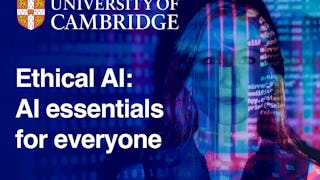The primary objectives of this course are to introduce concepts around defining AI and problematizing it's regulation, doing both from a philosophical standpoint. In this course, you'll be introduced to basic philosophical methods and have the opportunity to practice with logical statements. This practice will help you as you critically evaluate arguments for validity and soundness while forming your own opinion on the ethics of AI and AI regulation.

Enjoy unlimited growth with a year of Coursera Plus for $199 (regularly $399). Save now.

Skills you'll gain
Details to know

Add to your LinkedIn profile
See how employees at top companies are mastering in-demand skills

There are 4 modules in this course
This module provides a thematic overview of course content and introduces various philosophical concepts and tools to aid in thinking about questions of responsible AI. In this module, you will acquire a shared definition of AI as well as a basic overview of philosophy as it relates to this topic.
What's included
11 readings2 assignments1 app item2 discussion prompts
In this module, you’ll learn more about the philosopher’s tool of argumentation. You will identify types of arguments and practice constructing valid and sound arguments. This will help you, as you evaluate conflicting claims and judge evidence. These skills will be crucial in helping clarify your own thoughts and articulating them clearly.
What's included
1 video5 readings3 assignments1 peer review1 app item
In this next module, you will explore normative and prescriptive statements, concepts that are crucial for making informed decisions. Understanding these statements not only deepens your critical reflection on AI, but also empowers you to navigate the increasingly complex landscape of AI regulation. It also outlines some of the existing legal regulatory landscapes related to AI, as exemplified by the General Data Protection Regulation (GDPR), the European Union’s AI Act, the Biden Administration’s Executive Order on Safe, Secure, and Trustworthy Artificial Intelligence, and the AI Safety Institute’s Strategic Vision. During your exploration of regulation frameworks and how to operationalize responsible AI practices, you will consider the ethical and practical implications involved in this technology. Understanding how AI is regulated, and the rationale behind these regulations, is key to making informed choices and engaging in meaningful conversation around regulation concerns in AI.
What's included
2 videos9 readings3 assignments1 discussion prompt
This module summarizes some general questions about regulating AI and more specific questions about the strengths and weaknesses of some current regulatory approaches. In this final module, you’ll utilize the argumentation tools you acquired in previous modules to grapple with some of the big picture questions of regulation: who would be responsible for it and how would it be implemented?
What's included
9 readings2 assignments1 discussion prompt
Instructor

Offered by
Explore more from Philosophy
 Status: Free Trial
Status: Free TrialFractal Analytics
 Status: Preview
Status: PreviewFred Hutchinson Cancer Center
 Status: Preview
Status: PreviewJohns Hopkins University
 Status: Preview
Status: PreviewUniversity of Cambridge
Why people choose Coursera for their career





Open new doors with Coursera Plus
Unlimited access to 10,000+ world-class courses, hands-on projects, and job-ready certificate programs - all included in your subscription
Advance your career with an online degree
Earn a degree from world-class universities - 100% online
Join over 3,400 global companies that choose Coursera for Business
Upskill your employees to excel in the digital economy
Frequently asked questions
To access the course materials, assignments and to earn a Certificate, you will need to purchase the Certificate experience when you enroll in a course. You can try a Free Trial instead, or apply for Financial Aid. The course may offer 'Full Course, No Certificate' instead. This option lets you see all course materials, submit required assessments, and get a final grade. This also means that you will not be able to purchase a Certificate experience.
When you purchase a Certificate you get access to all course materials, including graded assignments. Upon completing the course, your electronic Certificate will be added to your Accomplishments page - from there, you can print your Certificate or add it to your LinkedIn profile.
Yes. In select learning programs, you can apply for financial aid or a scholarship if you can’t afford the enrollment fee. If fin aid or scholarship is available for your learning program selection, you’ll find a link to apply on the description page.
More questions
Financial aid available,
¹ Some assignments in this course are AI-graded. For these assignments, your data will be used in accordance with Coursera's Privacy Notice.

